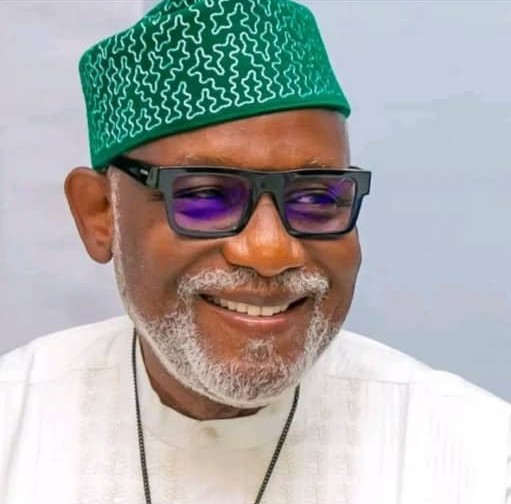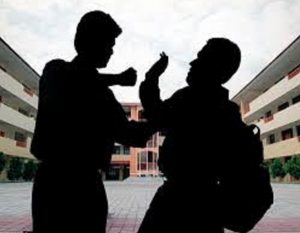
Photo Credit: Black Campus magazine.
Arakunrin Akeredolu was born on 21 July 1956 to J. Ola Akeredolu of the Akeredolu family in Owo, Ondo State.
He had his primary education in Owo and proceeded to Aquinas College, Akure; Loyola College Ibadan, Oyo State, and Comprehensive High School, Ayetoro, for his Higher School Certificate (HSC). He later proceeded to the University of Ife (now Obafemi Awolowo University) to study law and graduated in 1977.
He was a well-rounded student who passed through the school and allowed the school to pass through him. His love for basketball was so passionate that he represented the western State of Nigeria in 1974 at the National Sports Festival. He also represented the University of Ife in basketball competitions.
Growing up was fun, and taunted by friends who called him Akeredolu eti (eti is the Yoruba word for ear) possibly, for his large ear lobes, later abbreviated to Aketi- a sobriquet.
As a member of the Palm wine drinkards Club at the University; he loves his palm wine and would describe alcohol as “poison” and would sing and dance to songs glorifying the drink. Fela’s music was one of his favourites.
He was ebullient, a frank and unrestrained personality that would say things the way they are. As a dogged fighter, he went into student unionism, became President of the Law Students’ Society and was very vocal as a member of the NANS.
Aketi was called to the Nigerian Bar in 1978, elected as the President of the Nigerian Bar Association (NBA) in 2008 and became a Senior Advocate of Nigeria (SAN). His leadership of the NBA was marked by vibrancy and activism with emphasis on respect for human right.
On assumption to the office as governor, he cleared six months of salary arrears owed civil servants;
His government recruited over 200 medical doctors and other health workers to replace those who left the system.
He built a 500-bed complex in the teaching hospital in Akure and Ondo with seven functional theatres, four in Akure and three in Ondo, respectively.
His administration constructed an interchange bridge, christened Redemption Bridge, Ore.
He embarked on afforestation project in partnership with Wewood from China.
Sectors such as education and agriculture received appreciable boosts from his administration.
His administration renovated, rebuilt or constructed almost 800 primary schools through the State Universal Basic Education.
The administration constructed 100,000-capacity poultry pens and established the Idanre Chocolate factory.
Mr Akeredolu was one governor who did not mince words in faulting the current political and economic structure of the Federation, where all powers resides with the centre to the detriment of the sub-national.
He coordinated other states in the South-west to create the Western Nigerian Security Network known as Amotekun in the absence of the Federal Government’s readiness to approve the formation of state police.
Akredolu’s vision for the Amotekun Corps was to be able to carry automatic rifles, a call to which the Federal government of Nigeria refused to approve.
His leadership of the South-west Governor’s Forum gave a bite to the developmental drive of leaders of the region.
Aketi’s approach to governance and commitment to the protection of the interest of the people made him one who could speak truth to power and would not be intimidated by any political figure if his convictions were challenged.
This was manifested in his vehemence in the call for the transfer of power to Vice President Goodluck Jonathan in 2009 during the political logjam arising from the ailment of late President Umar Yar’Adua.
It is ironic that, at the height of Aketi’s illness, people had to pressure him to hand over to his deputy.
However, some believe that his illness was hijacked by some politicians to harness their positions.
The people who knew Aketi as principled now wondered why the Aketi they knew would allow himself enmeshed in the lingering political controversy of constitutionally handing over to his deputy when it was clear that his health would not allow for optimal performance.
Akeredolu who had a long period of medical absence, in anticipation of another medical leave presented a “signed” (believed to be forged) notice appointing deputy governor Lucky Aiyedatiwa, as acting governor of the state.
Akeredolu died 15 days later, making him the fourth Nigerian governor to die in office since the country returned to democracy in May 1999.
Muhammadu Shehu Kangiwa of Sokoto State died after falling from a horse while playing his favourite game of polo in 1981; Patrick Yakubu Yakowa of Kaduna State, died in 2012 in a military jet crash, and Mamman Ali of Yobe State, yielded to death in 2009 after a long battle with leukaemia.
Known affectionately as Aketi, Akeredolu has impacted Nigeria’s political terrain.
What’s your thought on this story?





















